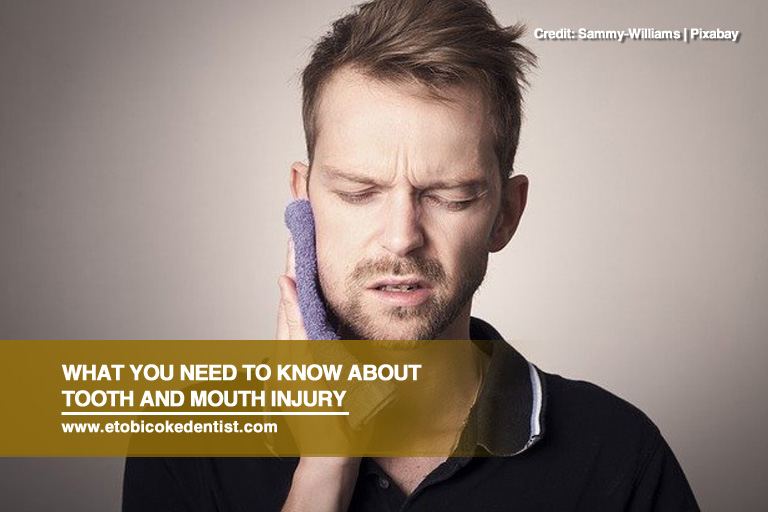
Tooth and mouth injuries are common dental emergencies. It can happen to people of all ages. It can happen to adolescents during rough play or to infants falling while still learning to walk. About 80% of dental injuries affect the front teeth and may also affect soft tissues, such as the tongue, lips, and inner cheeks. The effects of these injuries can be painful and may damage your teeth permanently if untreated.
To sidestep the pain and inconvenience of living with a broken tooth, learn which habits and activities can put your mouth at risk and how to deal with a dental emergency.
What Is Tooth and Mouth Injury?
Tooth and mouth injury, often referred collectively as a dental injury, is damage to the cavity of the mouth or its surrounding areas, including the teeth, jaw, lips, tongue, gums inner cheeks, roof of the mouth, neck, or tonsils.
Bleeding and swelling are common symptoms related to dental trauma, although damage might not always be visible. Other signs of tooth and mouth injury are toothache and swollen gums.
Common Tooth and Mouth Injuries
Tooth and mouth injuries often involve cuts, bruises, sores, and fractures sustained from direct impact to the mouth. Other examples of dental injuries are:
- Chipped Tooth
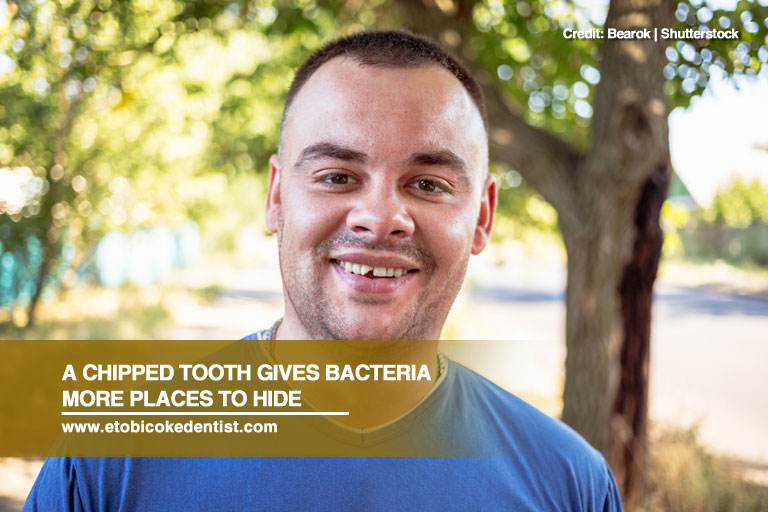
A chipped tooth is the most common dental injury but is also the most overlooked. There are those who believe that a chipped tooth is a cosmetic concern rather than a dental emergency. While a tiny chip may not cause pain, it gives bacteria and plaque additional spaces to build up. Additionally, bigger chips can expose nerve endings, which will ultimately lead to increased tooth sensitivity and tooth loss. Whether large or small, have a chipped tooth treated by your dentist.
- Cuts on the Tongue or Inside of Cheeks
Cuts on the tongue or cheeks usually develop after accidentally biting them while eating. Wounds on the tongue don’t often need sutures and tend to heal quickly. However, it is possible to require stitches to close large and deep wounds. - Cuts or Bruises of the Lip
Cuts or bruises to the lips are usually a result of direct impact. As the gums, tongue, and lips have a large supply of blood, cuts to these areas may bleed excessively. These areas also heal quickly so stitches may also not be necessary.
When the injury doesn’t stop bleeding after 10 minutes of applying pressure or if the cut is deep or longer than half an inch, you have to see a doctor immediately. If you notice your lip showing signs of an infection a few days after the injury, seek medical help.
- Knocked-out Tooth
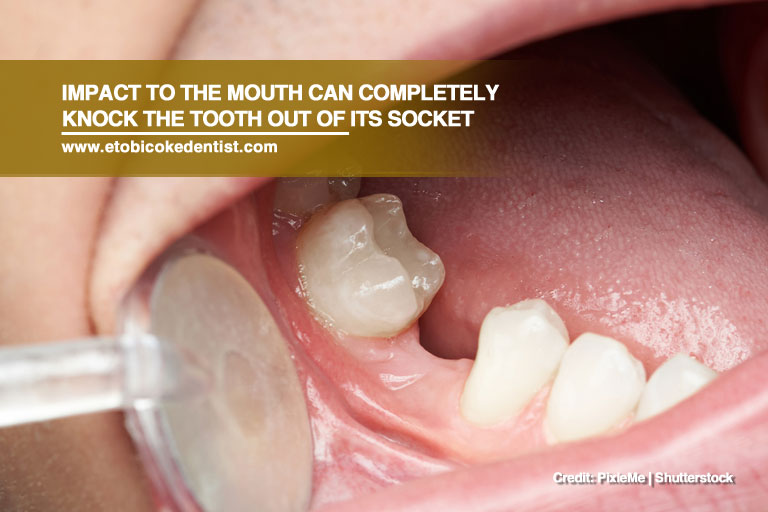
A knocked-out tooth is a dental emergency and requires the immediate attention of a dentist if you want to save it. Locate the tooth and place it in milk before you see your dentist. If the tooth cannot be located or is unusable, advances in dentistry will still, fortunately, allow your specialist to save your smile.
- Dislodged Tooth
A dislodged tooth occurs when the tooth has been displaced from its socket into another position. In this case, the tooth is still connected but loose, pushed back, forward, sideways, or rotated. If you have a dislodged tooth, you must see your dentist as soon as possible.
Additionally, because the trauma resulting in the dislodging can also cause significant damage to the pulp. Treatment for this type of injury often involves regular evaluation to determine if a root canal procedure or tooth extraction is necessary.
- Serious Oral Injuries
Serious injuries involving the tonsil, soft palate, or back of the throat are also a possibility. Puncture wounds from falling while holding a pencil or a toothbrush in your mouth needs the immediate attention of a doctor. Stay safe by avoiding these activities altogether.
What Are the Common Causes of Tooth and Mouth Injuries?
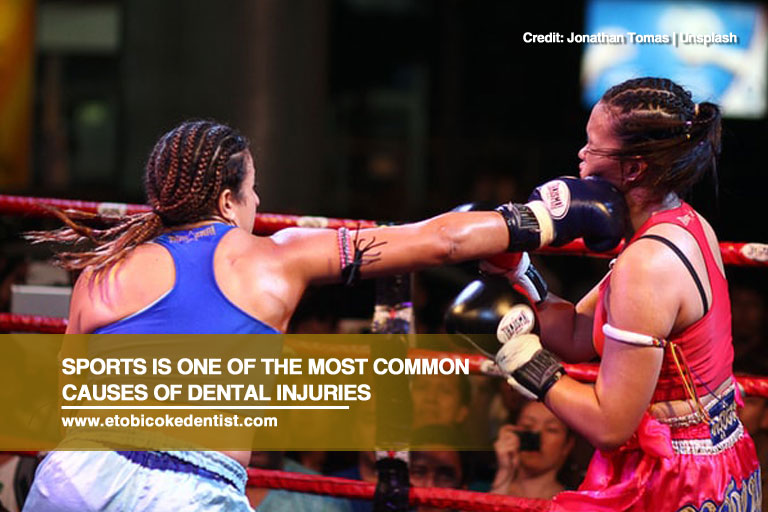
Trauma to the mouth and teeth can be caused by a variety of factors. The most common are:
- Sports Injuries
Sports injuries account for most cases of dental injuries. A study in Canada shows that the oral region is the third most common injured body part after arms and legs. With balls, bats, sticks, and quick movements around you, an injury is unavoidable. A hard tackle, an elbow, or a ball directly to your face can easily knock your tooth or bust a lip. - Injuries at Home or Work
Slipping or falling is a genuine risk whether at home or work. Structural flaws, such as rough surfaces or broken railings, or improperly stored objects may cause you to slip, trip, and fall. - Teeth Grinding
Grinding your teeth, especially at night, may hurt, chip, or loosen your tooth. It can also wear and break your orthodontic wire or bracket, causing it to rub or puncture the inside of your mouth. - Poor Oral Hygiene
If you do not brush or floss regularly, you are making your mouth at risk of disease. A small cut can easily be infected, causing severe pain, swelling, and sometimes, bleeding. Poor technique, like brushing too hard, can also hurt your mouth. - Injuries While Eating
Eating or biting on hard objects, such as pencils, ice cubes, nuts, and hard candies, are distressing for the teeth and may cause them to loosen or fracture with repeated pressure.
How Do I Prevent Mouth Injuries?
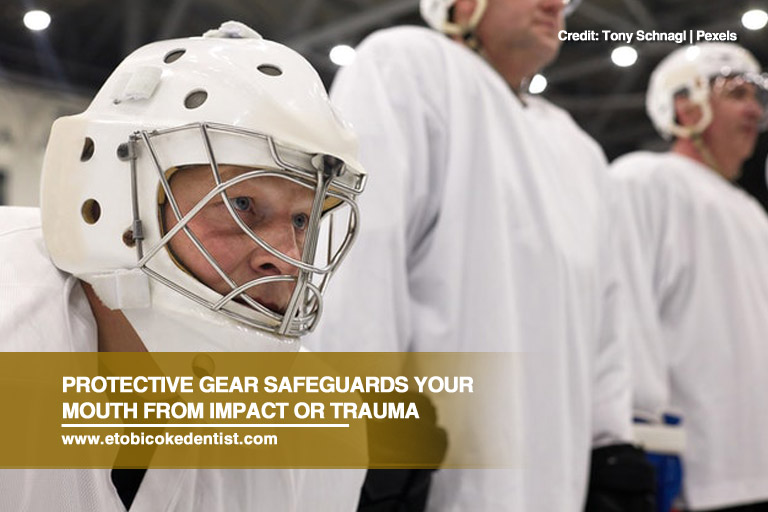
To prevent tooth and mouth injury, it is necessary to take the following precautions:
- Wear Protective Gears
When playing sports or doing activities that put your mouth at risk of trauma, always wear protective gear, like mouth guards, face cages, and helmets. - Wear a Night Guard
A night guard prevents tooth injuries resulting from teeth grinding (bruxism). - Supervise Young Children
Young children are extremely vulnerable to dental injuries. Whether they are still learning to walk, play, or bathe, they must have proper supervision. - Avoid Eating Hard Foods or Chewing on Hard Objects
Most cuts and tooth fractures happen while eating hard foods, like nuts, candies, or non-food objects, like cans and pencils. Minimize intake of hard foods and use your teeth only for eating to ward off injury. - Take Safety Precautions at Home or Work
Taking the extra mile of safeguarding your home or workplace benefits you and those around you. Putting safety gates, handrails, paddings, as well as keeping your walking path free from any objects can reduce incidents of slipping and tripping.
How Long Does a Mouth Injury Take to Heal?
Most mouth injuries take only a short time to heal when properly cared for. Minor injuries may heal as quickly as 3 or 4 days.
How to Stop Bleeding in the Tongue, Lips, or Gums?
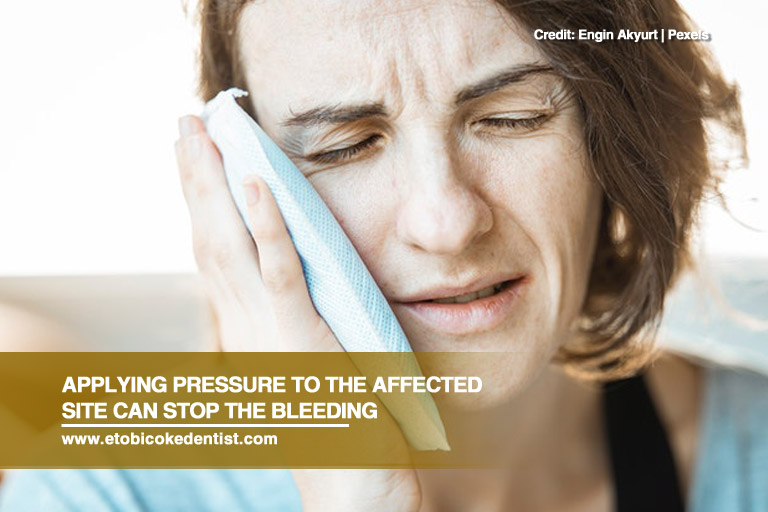
If you have a dental injury, apply first aid as soon as possible. Clean the injured area and remove any debris. Apply pressure to the bleeding for 10 minutes. If there’s swelling, apply an ice cube or popsicles to the injury for 20 minutes. Eat soft foods while healing so as not to disturb the wounded area. Salty, acidic, or citrusy food can also irritate the injury.
How Do You Treat a Mouth Injury?
Treatment of a tooth or mouth injury depends on the type of injury and its severity. However, the best course of action is to see your dentist.
If the pulp of the tooth is injured, root canal therapy may be needed. If the tooth is loose or dislodge, your dentist will stabilize it with a splint or bond it to another tooth.
Tooth and mouth injuries can happen to anyone at any time. Given the unpredictability of dental emergencies, it is important that you come prepared. Having an emergency dentist is one way of ensuring that you can have your teeth fixed and treated as soon as possible.
For emergency dentistry in Etobicoke, visit Dr. Mark Rhody Dentistry. Call our office at (416) 231-4281 if you have a dental injury and we’ll alleviate your pain and prevent future problems as quickly as possible.
